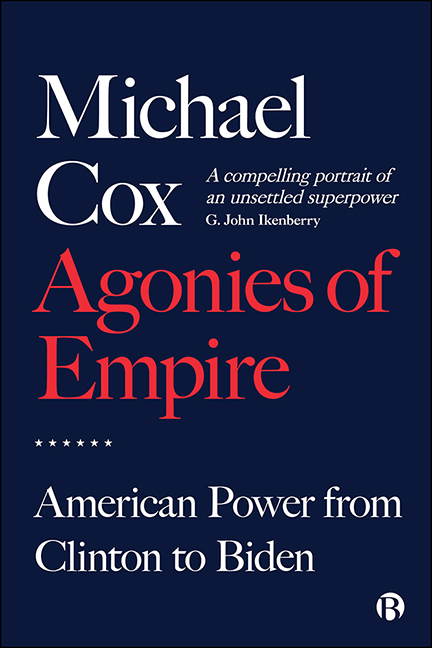Book contents
- Frontmatter
- Dedication
- Contents
- About the Author
- Preface
- Introduction: The Rise of an Empire
- PART I Clinton: Liberal Leviathan
- PART II Bush Jnr: Empire in an Age of Terror
- PART III Obama: Towards a Post-American World?
- PART IV Trump: Turbulence in the Age of Populism
- PART V Biden: Is America Back?
- Notes and References
- Acknowledgements
- Index
PART III - Obama: Towards a Post-American World?
Published online by Cambridge University Press: 15 September 2022
- Frontmatter
- Dedication
- Contents
- About the Author
- Preface
- Introduction: The Rise of an Empire
- PART I Clinton: Liberal Leviathan
- PART II Bush Jnr: Empire in an Age of Terror
- PART III Obama: Towards a Post-American World?
- PART IV Trump: Turbulence in the Age of Populism
- PART V Biden: Is America Back?
- Notes and References
- Acknowledgements
- Index
Summary
For a president who saw as his role as healing the nation after eight very turbulent years, Obama turned out to be a most controversial president. Some claimed that he was not hard-nosed enough when it came to dealing with the ‘real’ world; progressives, on the other hand, felt he was far too cautious; meanwhile, conservatives on the right (including his ultimate successor, Donald Trump) accused him of being a dangerous liberal who was undermining US national security. Some of the more conspiratorially inclined even claimed that not only was Obama not an American – and thus ineligible to be president – but he may even have been a Muslim planning to undermine America from within. Clearly, a large part of the more lurid tales spread about the 44th president had to do with race and the fact that Obama was the first African-American in the White House. But there were also long-standing differences, both over domestic politics (many Republicans accused him of being a socialist) as well as foreign policy. Indeed, from day one he was attacked on almost every front from his willingness to engage with America's rivals to his determined efforts to push forward on climate change. Multilateralist by inclination but realist in outlook, his subtle diplomacy certainly made itself an easy target for those advocating simple solutions to deal with complex global problems. Obama, however, always remained optimistic when it came to the United States. He did not agree with the fashionable idea that America's best days were behind it. On the other hand, he did accept that the world was becoming less of an American playground and that the US would have to make the necessary adjustments to deal with the new situation. However, his first task, as we show in Chapter 6, was to pull the United States out of the deep economic recession it found itself in following the 2008 financial crisis before it could go then on to address America's many other global challenges. One of these, as we indicate in Chapter 7, was how to breathe life back into a transatlantic relationship which under Bush Jnr had suffered one setback after another.
- Type
- Chapter
- Information
- Agonies of EmpireAmerican Power from Clinton to Biden, pp. 77 - 78Publisher: Bristol University PressPrint publication year: 2022



